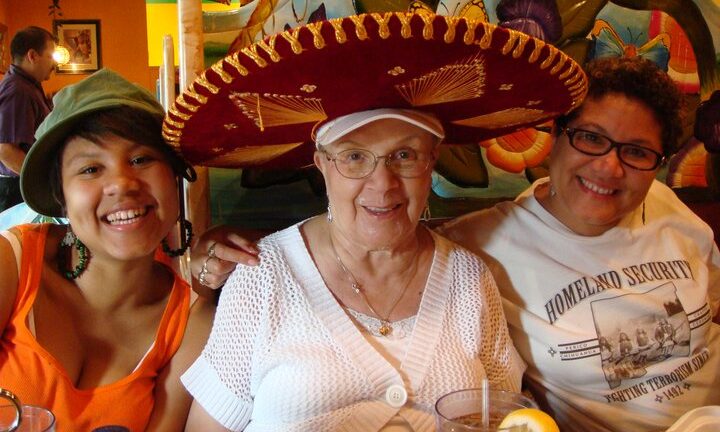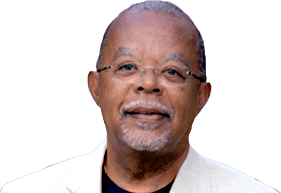Honey-Marie Braswell

In this picture is me, my grandmother and my mother. Three generations of black women although it may not appear to be. My daughter is the fourth and wasn’t photographed right here. My grandmother Mary Ellen North Singleton Heard died two and a half years ago, a month before my son was born, and might be buried in that very graveyard in the documentary (I couldn’t attend the burial in SC as I was preparing for exams). She was a fascinating woman having been raised in Charleston, South Carolina born in 1924, been married twice, had her 1st husband die when she was just 19 or 20 and lived the life of a military wife, speaking of living in Italy, Canada and all along the East Coast of the United States. I remember going to Charleston for the first time in 1991 and hearing family members speaking Gullah…I thought they were Jamaican as I am a Baltimore native.
My grandfather (a Louisiana creole), Clemonce Raymond Heard born in 1919 (he died 2 years ago) was raised by his maternal Grandmother from the Natchitoches tribe and didn’t even speak English until he was 13 and first entered school. He forgot his Native language once Catholics in L.A. persuaded his parents that his grandmother was hindering him from learning English. His father was half French/Cajun (maybe some Irish) and Haitian. Anyway, my grandfather after having served in the Navy as a Cook was stationed in Fort Meade, (later on he became a Chef and my mother was born there). Her sister was born in Rhode Island and her brother was born in Canada and was the first black baby to be born at that particular hospital.
My mother’s mother didn’t always own up to being Geechie. She would say her mom just taught Geechie school children which she did. She had moments where she would be torn between whether or not to own her blackness. But she preserved her culture through stories, her cooking (nobody made gumbo like her), and pictures.
My grandmother told many stories. One that sticks out was her sister Louise who decided to pass for white after having moved to New York. Her husband treated her poorly once he found out relatives came to get her and she spent the rest of her life in a mental hospital in Charleston. I met Louise when I first visited Charleston. It was such an honor especially as she was my grandmother’s favorite sister. Another one of her favorite sisters was Claudia C. Blaney and had a school named after her in Charleston, SC.
In my dad’s family I do not know quite as much. I did have the opportunity to meet his maternal great grandmother. My great-great grandmother Roberta Byrd was 100 years old when she died. On her 100th birthday she said she didn’t want to live another year.
My dad’s mom was not raised by her mother although she saw her often and didn’t even know that her mother was Ms.Thelma the woman she thought was so pretty and wished was her mother.
There was a nasty divorce between my great grandmother and her husband Anthony Powell who was part Native American. Not much is known about his Native American side (I have heard talk of him being a descendant of a Native American Chief). I won’t dispel the talk as entirely myth. My grandmother looked every bit the Native American she claimed to be. I would be shocked to find out otherwise.
My grandmother Monica Regina (Powell) Green was raised by her grandmother Jeanette Cook Rice and her husband. Jeanette Cook, worked as a maid, sent my grandmother to Catholic school, did her hair, bought her a white baby grand piano, beautiful clothes and gave her as all the love she could give. Jeanette’s heart was broken when she learned my 16 yr. old grandmother was pregnant with my father.
My grandmother grew up feeling unloved in many ways because her own mother Thelma did not raise her. Thelma, didn’t really raise any of her children so I heard. It was a shock to me as a child because Grandma-Thelma was so nice (and I thought she was rich). My great uncles Gregory and Tony spent more time with Grandma Thelma than any of her children. In fact, Tony lived in the Baltimore City row house on the West side that Thelma’s father bought—my great-great grandfather. Imagine that a biracial black man nonetheless bought is own home and passed it down the generations. Tony is now deceased and his second wife (Margaret) of many years lives there today. I visited that house as a child and always had a particular fascination with it.
On my father’s mother’s side (Monica Regina/Jeanette Cook) of the family we attend the Hill/Cook Family Reunion which is held every 1st Saturday in July in Taneytown Maryland. Despite being told that Jeanette cook was an orphan raised by nuns it surprises me that she would have perhaps attended this reunion. I wonder how could she have been an orphan and yet still kept her familial ties in this way.This is a reunion that is well over 100 years old.
Not much is known about my father’s fathers side of the family. All I know is that he was a very fair pigmented African American man with Blonde hair and gray eyes from Georgia named Lenard Braswell. My dad hasn’t seen him since he was two and hates talking about his biological father. I would one day like to see what the Georgia Braswell’s look like.
I have met the Braswell’s in Oxford, North Carolina, where my parents decided to build a home near after making the decision to leave Baltimore when I was a teenager. The Oxford Braswell’s were very nice people. One of them a retired school teacher showed me a picture of her neice who shared a striking resemblance to me when I was a small child. When it’s all said and done I would like to know how the Braswell’s in Georgia and the one’s in North Carolina are related.
When I was 6 my mother began teaching me about Black History not long after I told her I was orange (I thought Ernie from sesame street looked close to my skin color). She took me to the Blacks in Wax Museum around that age. I remember seeing a representation of what a slave ship looked like. Children used to play on it. Growing up I didn’t think to much into the fact that children our age were aboard the ship.
My parents grew up Catholics and were born in 1960. They are high school sweethearts and college graduates and have been married 29 years. When I was 5 both of my parents joined the African Methodist Episcopal Church. From an early age I grew up learning about Richard Allen and was pleased to see his role in black history being mentioned in great detail in this documentary. Having majored in Anthropology (a predominantly white major and having been one of two or three blacks to graduate in 2011) at The University of North Carolina at Greensboro, history has always been a driving force in much of what I do. I became the president of our department’s Student Anthropological Society and that might be a historical first (I’ve never checked into it). Thank you Dr. Gates for this series!!!
In my family we value our Geechie and Creole and Native American history which is a part of our African American history and I hope to do my best to preserve my families culture by sharing the history of my people and our collective peoples with both of my children.




